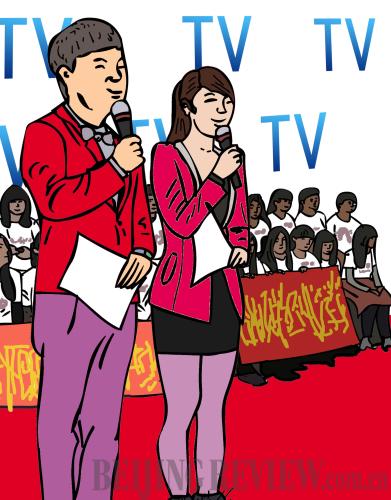|
 |
|
(LI SHIGONG) |
Putonghua, more commonly known as Mandarin in English, is China's official standard language, with efforts to popularize it across the country beginning as early as 1955. Today, the necessity of it being further popularized is being stressed once more. Recently, China's media watchdog, the State General Administration of Press, Publication, Radio, Film and Television, issued a notification, requesting all TV and radio presenters to speak standard putonghua and refrain from using any dialectical vocabulary, slang, or foreign languages during programs, except for special cases where it is necessary. The administration said that presenters should take the lead in promoting the use of standard putonghua.
Program hosts will not be allowed to "imitate" the characteristic pronunciation of dialects. Presenters should also guide their guests to use standard expressions, and avoid mixing foreign languages and slang with putonghua. Variety show hosts are a key target, as "substandard" language is frequently used in their programs.
This media report has triggered discussion online. While some people welcome the administration's move, saying that it will be good for the country's unity as putonghua benefits the communication of people nationwide, others say that authorities should give better protection to dialects in a bid to protect local culture. The latter believe that local TV stations should have the right to make programs that celebrate their local culture, including their dialect, and that doing so will not harm Chinese culture as it actually preserves it better. The following are excerpts of opinions:
Zhang Jaian (www.cnwest.com): As a form of mass media, TV and radio broadcasters are obligated to take the lead in popularizing standard putonghua. The use of standard putonghua in TV and radio programs is not a move to oppress dialects. It is only to restrict irresponsible use of language in mass media. Imitating the pronunciation of dialects and using slang in programs is unprofessional.
Huang Chunjing (www.cnwest.com): Every citizen has the right to choose whether they speak dialects or putonghua, and similarly, TV and radio stations have the right to decide whether dialects or putonghua will be used in their programs. The popularity of certain dialects in certain provinces or cities does not change the dominant role of putonghua in China's mass media. The administration is going too far to restrict the use of dialects with an administrative order.
Guan Dongke (Shenzhen Economic Daily): In the past, if you wanted to be a news presenter, you had to pass a standard putonghua examination. Today, it seems that the requirements are declining, as you will easily find a number of presenters using local dialects on both TV and radio alike. Some of these hosts are even famous in their province or prefecture.
Putonghua needs to be promoted around the country. According to China's Ministry of Education, 70 percent of Chinese citizens are able to communicate in putonghua, but a large number of these people have a low level command of putonghua and a further 400 million people are still unable to communicate using putonghua. Due to these factors, the administration has demanded that presenters play a leading role by using standard putonghua in their TV and radio programs.
As far as media hosts are concerned, to speak putonghua is not only one of the basic professional requirements but also an obligation.
It is necessary to refrain from imitating Hong Kong or Taiwanese accents or using expressions peculiar to local dialects or foreign languages. Not all programs should be brought under this language control plan however. For example, many local TV stations have opened hot lines, helping local people to solve the difficulties in their daily lives, and local dialects are often used. As most of the audience are local people who are used to their regional dialect, sometimes people feel that way of speaking is more acceptable than standard putonghua.
| 